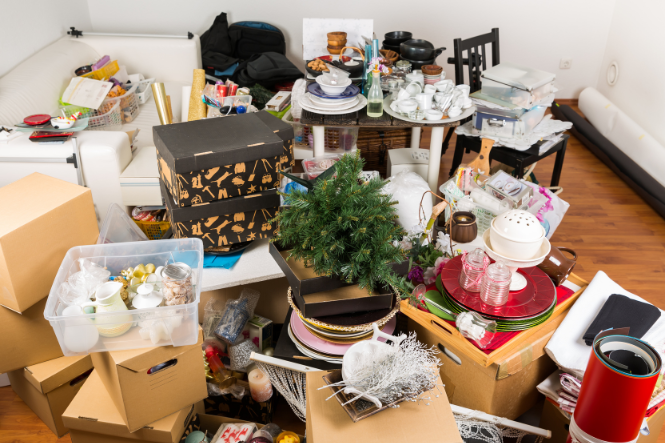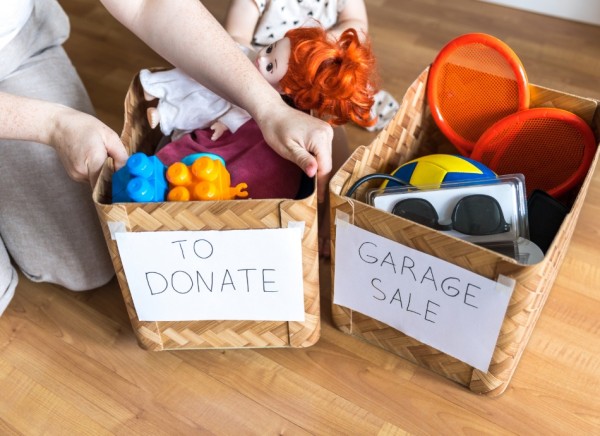You can now add Healthify as a preferred source on Google. Click here to see us when you search Google.
Decluttering and downsizing tips
Key points about decluttering and downsizing
- Decluttering and downsizing your belongings are powerful ways to bring more calm and order into your daily life.
- Clearing out excess belongings not only makes your space more functional, it supports better mental, emotional and even physical wellbeing. Plus, it’s good for the planet!
- Learn more about the benefits of decluttering and practical tips to get you started.

The mental health benefits of decluttering
Decluttering isn’t just about clearing away physical objects – it’s also about emotional wellbeing. People often report feeling less guilt, stress, and frustration after dealing with clutter. When you organise your things, you regain a sense of control and self-esteem, making you feel proud of your space and comfortable inviting others into your home. For many, decluttering can even lead to better relationships and more time for enjoyable activities and meaningful connections.
Reasons to declutter:
- It reduces stress and improves mood: A cluttered environment can cause stress and overwhelm, making it harder to relax and enjoy time at home. Research shows that living in a tidier space leads to feeling calmer, more in control, and even happier.
- It helps you enjoy your home: It’s much nicer to cook in a clean kitchen where you can find all your utensils and sleep in a calm, peaceful bedroom than be surrounded by piles of belongings. Less ‘stuff’ and more open spaces can make it easier to display and enjoy your favourite things – like family heirlooms, treasured gifts and sentimental trinkets.
- It’s better for your health: Less clutter means fewer places for dust, mould and allergens to hide, creating a healthier, airier space overall.
- It makes cleaning a breeze: Anything that makes cleaning easier must be good! Fewer possessions mean less dusting, vacuuming and no piles of unsorted things spilling out when you open a cupboard door.
- It can save you money: Decluttering helps you sort out what items you already have, what you use, what you don’t need, and reduces double-ups or wasted purchases.
- It makes you house proud: A decluttered, ordered environment is one you’ll be keen to share with whānau and friends.
- It models good habits: Decluttering and simply needing less possessions can teach other family members, children and friends about living simply – without the need for the newest gadget or hot item. Plus, keeping a small footprint without accumulating more – and using more – is better for the planet.
- It can prepare you for the next stage in life: Downsizing before a move, family changes, or new lifestyle goals can make transitions smoother and less stressful.
Having clutter is different to hoarding. While clutter means having disorganised or excess items in places where they don’t belong, most people can clean up or discard them when needed. Hoarding can lead to a recognised disorder where possessions overwhelm living spaces and severely interfere with everyday life and wellbeing. Read more about hoarding disorder.
Getting started can feel overwhelming, but the key to decluttering is to break the process into small, manageable steps. Here are some proven ways to tackle the clutter and decide if something stays or goes:
Make a plan: Write a list of areas to tackle and break big jobs into smaller tasks. There are plenty of places for clutter to gather but these might be some good places to start:
- the kitchen ‘junk’ drawer
- bedside tables
- the kitchen table
- home office desk
- kids’ toy rooms, toy baskets
- bathroom cupboards and drawers
- cosmetics and makeup
- shoes
- wardrobes
- plastics and takeaway containers in the kitchen
- the garage – this one might be best to leave until last or until you can organise help and support (see below).
Prepare your tools: Have boxes or bags for Keep / Donate / Sell / Ditch plus cleaning supplies ready, so you can clean emptied shelves and surfaces as you go.
Start small: Pick one drawer, shelf, or surface to begin – quick wins keep you motivated. A good place to start might be the one area that really bugs you the most. Aim for one drawer, surface or area a day and if you think it feels overwhelming, limit yourself to 10 minutes – set a timer. Decluttering doesn’t have to feel like a chore – play some music or listen to a podcast while you tackle one spot.
Ask yourself these questions as you go. For each item, consider:
- Do I use this?
- Do I love it?
- Would I buy it again if I lost it?
- Is someone else able to use it? (If an item is broken or damaged, it’s unlikely you’d want to pass it on or donate).
Use the 'one in, one out' rule: For each new item brought home, let something else go. Move unwanted items out of the house quickly to avoid new clutter piles building up. There are several businesses around Aotearoa New Zealand who can supply a clutter box you can fill with your unwanted items. Then they’ll collect and move it on to someone else who needs it.
Get help when needed: Ask a friend or family member to assist or keep you accountable. They might not have the same emotional connection to some of the things you can’t bear to let go. If sentimental items are tough to part with, try saving a photo or storing only the most meaningful pieces.
Let go of perfection: Aim for progress, not a perfectly tidy home. It’s about creating a space that works for you.
Join a programme: You can even sign up for daily reminders and tasks to help walk you through a structured decluttering process – perfect if you have decision anxiety or clutter-clearing fatigue. Check out Apartment Therapy’s decluttering cure(external link) – a free 14-day programme that’ll help you thoroughly declutter your home in just 2 weeks. (They seem to repeat this free course often so don’t worry if you’ve missed out on the dates listed. Check back again.)
Hopefully your decluttering efforts will result in piles (or boxes) of items to:
- keep
- donate or re-gift
- sell
- throw out.

Image credit: Canva
For the things you don’t want to keep, think about the best way to pass them on. You could:
- Sell them on Trade Me, Marketplace, a vintage store, or an antique shop.
- Give them to a friend or family member who’s shown interest in them.
- Get a stall at a local market, school fair or try a garage sale.
- Donate them to a good cause, like your local op-shop, a clothing bin, a clothing swap, or a charity such as Women’s Refuge, Red Cross or Woven Earth. Ask at your church if there are people in your community – such as newly arrived refugees – who might appreciate some used items. Animal refuges, some vets and pet stores are happy to receive clean, used bedding, blankets and pillows.
Local community group pages are also great for giving things away, especially larger items like furniture. What doesn’t fit your life might be just what someone else needs. Before you pass anything on, make sure it’s clean and in good condition.
You could also book a free inorganic collection with some local councils around the motu. But sometimes, it’s just ‘rubbish’ and best taken to the tip.
Once you’ve decluttered or downsized your space, develop routines to keep surfaces clear and organise things as you go. Remember, decluttering is less about rules and more about making your home a place that helps you feel relaxed, happy, and at peace.
One last tip: Try not to start accumulating more ‘stuff’ again. Think before you go shopping or buy online about what you really need in your life and where it fits in your home.
Inorganic collection(external link) Auckland Council, NZ
References
- The definitive guide to decluttering(external link) Your Home and Garden, NZ, 2022
- Mental health benefits of decluttering(external link) WebMD, US, 2024
- How decluttering boosts your mental health(external link) Good Magazine, NZ, 2024
- How to declutter your home: 100 decluttering tips(external link) Cleango, US, 2024
Credits: Healthify editorial team. Healthify is brought to you by Health Navigator Charitable Trust.
Last reviewed:





